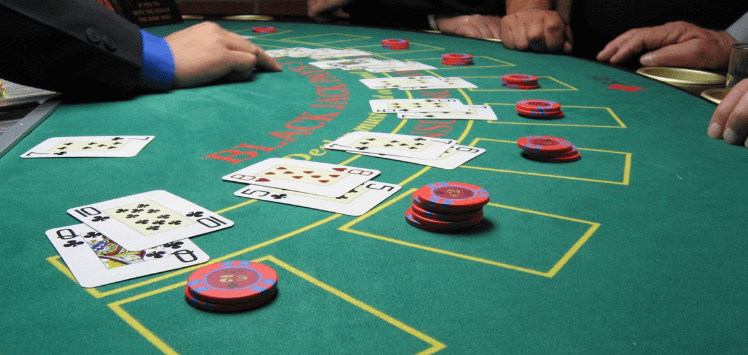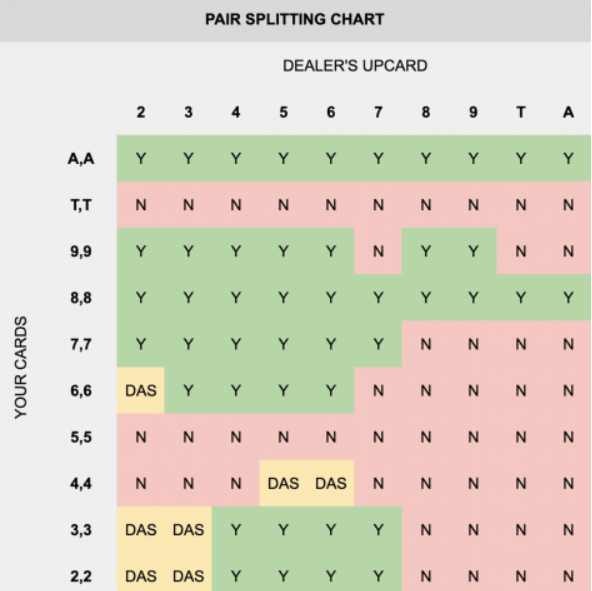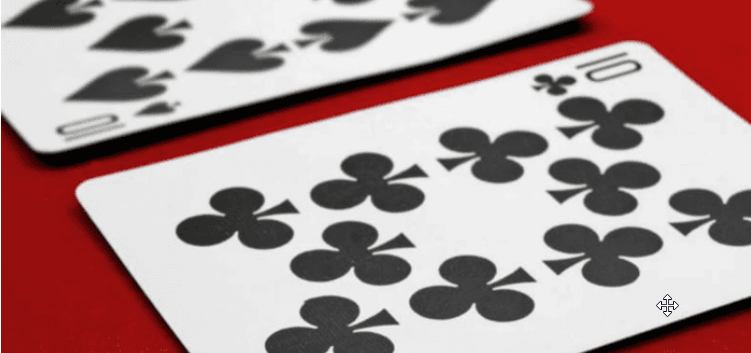When to Split in Blackjack: Maximizing Your Winnings
May 15, 2023
When playing blackjack, understanding the correct strategy can make all the difference in winning. One key aspect of this is knowing blackjack split rules. This technique can give you the upper hand, but risks are also involved. Therefore, it's essential to understand what splitting means and how it can affect your gameplay. So, His Majesty King Billy, Guardian of the Players, will provide all the information about splitting to help you maximize your winnings.

The Definition of Split in Blackjack
Before delving into when to split in blackjack, let's define what it means. When a player gets two cards of the same rank during a game round (for example, two 8s), they can separate them and create two new hands, each acting as an individual hand. This doubles their initial bet but also presents more opportunities for winning.
As such, the decision to split should be made strategically rather than impulsively, as it can impact your overall outcome. By splitting, players receive two separate hands and must play them independently, with a new card for each one.
Gamblers are tempted to split what seems like a promising hand to increase their chances, but this isn't always the best deal. Therefore, it is necessary to analyze when it is an intelligent choice and when it's not.
Strategizing Your Blackjack Splitting
Splitting can be a powerful tool, yet only if done correctly. While it is possible anytime you are dealt a pair, not every split is considered a good strategy. The best way is to follow some popular strategies.
One esteemed strategy revolves around a basic blackjack chart, which proffers statistically sound advice on when to split. These charts weigh the player's hand and the dealer's upcard to determine the optimal action. Adherence to these guidelines can bolster one's chances of success, though it is crucial to remember that no strategy is infallible.
For instance, these charts suggest that players should always split a pair of Aces and eights, no matter what the dealer's up card shows. In contrast, pairs of twos, threes, or sevens would better serve to hit instead.
Decision Time: When to Split Your Cards in Blackjack
Knowing when to split in blackjack often comes down to evaluating the dealer's upcard and gauging your odds. Certain card combinations present advantageous opportunities, while others may warrant caution. Some general guidelines are as follows:
- Always split Aces. Aces can be worth 1 or 11, making them highly versatile. It gives you two chances to hit 21 or a strong hand.
- Always split 8s. A pair of 8s total 16, which is a weak hand. Splitting 8s allows you to make two better hands and potentially increase your odds of winning.
- Split 9s when the dealer has a 2-6 or 8-9. It can be beneficial when the dealer's upcard is weak (2-6) or moderate (8-9). In such a situation, the dealer is likelier to have a weak hand at the end of the round.
- Split 7s when the dealer has a 2-7. If the dealer's upcard is weak (2-7), splitting 7s can give you a better chance, as the dealer is more likely to bust or end up with a weaker hand.
- Split 6s when the dealer has a 3-6. It is generally only recommended when the dealer's upcard is weak (3-6), as this increases your chances by making two potentially stronger hands.
- Split 4s only when the dealer has a 5 or 6, and doubling after a split is allowed. This is a specific situation where splitting 4s can be advantageous. In other situations, it is better to hit.
- Split 3s and 2s when the dealer has a 2-7. In this situation, splitting can provide an opportunity for two potentially stronger hands, increasing your chances.

These are general recommendations, and the optimal decision will depend on factors such as the number of decks in play, game rules (such as whether or not resplitting is allowed), and player skill level. Therefore it's crucial to maintain a clear head at all times.
Grounds Not to Split in Blackjack
Equally important to knowing the answer to the question “When should you split in blackjack?” is understanding when not to do so. A player must be able to identify the situations where splitting is disadvantageous, as misguided decisions can lead to unnecessary losses or missed opportunities. Below are some essential factors to consider when determining whether or not to split:
- Never split 5s. A pair of 5s total 10, which is a strong base for drawing another card. Splitting 5s would give you two weak hands. Instead, consider doubling down if the dealer's upcard is weak.
- Never split 10s or face cards. As mentioned earlier, a pair of 10s or face cards totals 20, which is a strong hand. Splitting this hand can only weaken it, making it less likely you'll win.
- Don't split 9s when the dealer has a 7, 10, or Ace. In these situations, you're better off standing with an 18, as splitting 9s may not improve your chances.
- Avoid splitting 3s and 2s when the dealer has an 8, 9, 10, or Ace. When the dealer has a strong upcard, it's better to hit instead of splitting these pairs, as your chances of winning are lower with two potentially weak hands.

There are also some considerations to bear in mind that go beyond the points mentioned above. First, factor in the house rules. The specific rules of the table or casino may impact the decision. For example, some establishments may not permit resplitting, which can limit the potential benefits of splitting specific pairs. Additionally, rules regarding doubling or the payout for 21 may influence decision-making.
Also, consider your bankroll. Splitting requires an additional bet equal to the original wager, which can quickly deplete one's bankroll if done recklessly. Players should be mindful of their financial situation and consider the potential risks of splitting, especially when facing a tight budget.
By considering these factors, casino players can make more informed decisions on when to split in blackjack, thus minimizing losses.
The Pitfalls of Splitting in Blackjack
Despite the potential benefits, this maneuver has drawbacks. It is crucial to recognize the potential pitfalls before delving into this intricate aspect of strategy. Below, we will list some of the significant disadvantages of splitting:
- It can require players to put additional money at risk. Splitting a hand means placing an extra bet equal to the initial wager on each of the new hands created. Consequently, you will need more funds in your bankroll and may face more considerable losses if things don't go according to plan.
- It can sometimes weaken good hands. While splitting a pair of 8s or Aces can make them stronger, other hands, such as a pair of 10s or face cards showing twenty points, are already strong. Splitting these hands could result in two weaker hands, ultimately reducing your odds.
- It adds complexity to an already intricate game. Blackjack is known for its complexities, as players need sophistication at every stage when playing the game. Splitting hands requires extra calculation, and it can be challenging for new players to determine when it's the right move. Too many decisions can be overwhelming and lead to mistakes, especially if the player lacks experience in the strategy.
Now you know the answer to the question “What is a split in blackjack?”. It can be an excellent way to increase your odds, but it requires careful consideration before you place that second bet. To maximize the benefits and minimize losses, use sound strategies based on statistical analysis and consider the dealer's upcard when deciding to split. The Land of King Billy provides demo games, making it easier for players to practice and perfect their gameplay.
FAQ
How often can a player split?
Blackjack split rules are pretty simple. Players can split when dealt pairs (e.g., two Queens or two fives). Some versions of the game may also have specific rules about resplitting. For instance, some may allow players to resplit up to three times or only once. So, it may vary depending on the rules of the particular game being played.
What cards can be split?
Players can split pairs of cards with the same rank. But it recommended following basic strategies based on the probabilities. Some of the best hands include Aces and 8s, while it's generally not recommended to split pairs of face cards or tens. Other pairs like twos, threes, and sevens depend on the dealer's up card.
Can the dealer split their hand?
The dealer is not allowed to split their hand. They must follow a fixed set of rules dictating their actions during gameplay. These rules require the dealer to hit a soft 17 and stand on a hard 17. Unlike players, dealers have no autonomy in their decisions and cannot employ strategic maneuvers like splitting.
< Back to the blog










